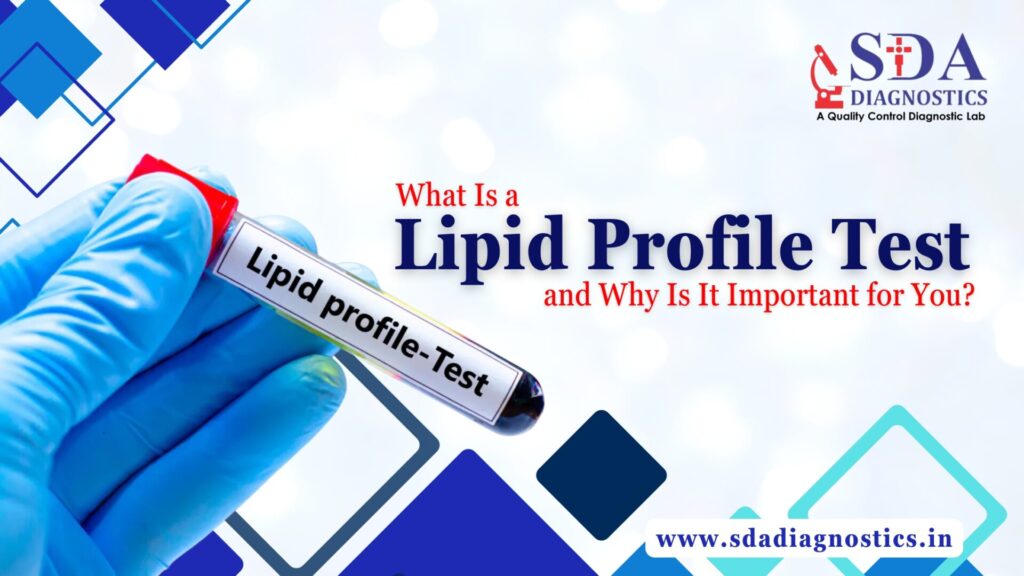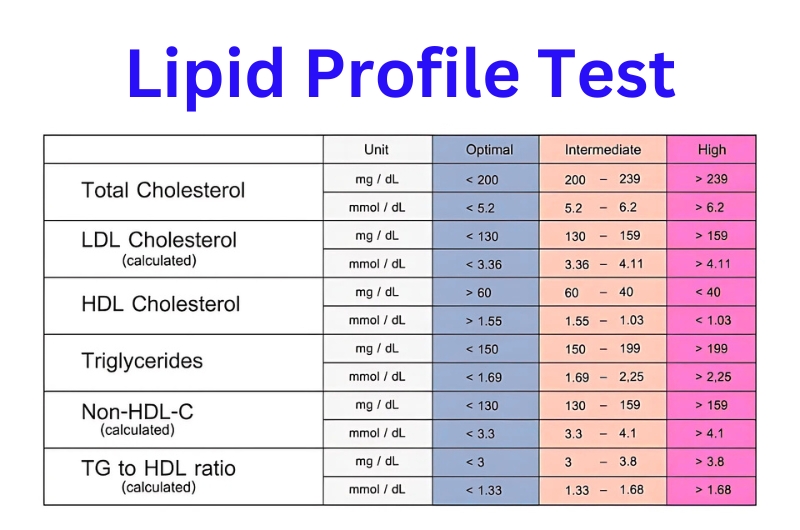What Is a Lipid Profile Test and Why Is It Important for You?

A healthy heart is essential for a healthy life, and one of the ways to ensure your heart is functioning well is by keeping a check on your cholesterol levels. This is where a Lipid Profile Test comes into play. It’s a common blood test that helps monitor the levels of fats, like cholesterol and triglycerides, in your body. These fats, also called lipids, play a crucial role in your body, but when they’re out of balance, they can lead to serious health issues like heart disease, stroke, and more.
So, let’s break down what the Lipid Profile Test is, why it’s important, and how it can benefit you.
What Is a Lipid Profile Test?
A Lipid Profile (also known as a lipid panel) is a blood test that measures the levels of various types of fats in your blood. The test typically looks at the following components:
-
Total Cholesterol: This is the total amount of cholesterol in your blood, including both good and bad cholesterol.
-
Low-Density Lipoprotein (LDL) Cholesterol: Often called the “bad cholesterol,” high levels of LDL can lead to plaque buildup in your arteries, increasing the risk of heart disease.
-
High-Density Lipoprotein (HDL) Cholesterol: Known as the “good cholesterol,” HDL helps remove excess cholesterol from your bloodstream, protecting you from heart disease.
-
Triglycerides: These are a type of fat found in your blood. High levels of triglycerides, especially in combination with high LDL and low HDL, can increase your risk of cardiovascular diseases.
-
Very Low-Density Lipoprotein (VLDL) Cholesterol: This is another type of bad cholesterol that can contribute to artery plaque formation.

Why Is the Lipid Profile Test Important?
The Lipid Profile Test is important because it gives you a clear picture of your heart health. High levels of bad cholesterol (LDL) and triglycerides can cause blockages in your blood vessels, leading to heart attacks or strokes. By monitoring your lipid levels, you can take the necessary steps to maintain a healthy balance and reduce your risk of these life-threatening conditions.
Here are some key reasons why this test is crucial:
-
Early Detection of Heart Disease: A Lipid Profile can help identify high cholesterol levels early on. This allows you to make lifestyle changes or start treatment before heart disease develops.
-
Managing Chronic Conditions: If you already have diabetes, hypertension, or any other cardiovascular condition, regular lipid tests are essential to manage your health effectively. These conditions often affect your cholesterol and triglyceride levels.
-
Monitoring Treatment Progress: If you are on medications to lower cholesterol, such as statins, the Lipid Profile will help you and your doctor track the effectiveness of your treatment.
-
Preventive Health Measure: Even if you’re generally healthy, taking a Lipid Profile as part of your routine health check can help you avoid future complications. It serves as a preventive measure to ensure your heart is in good condition.
Who Should Take a Lipid Profile Test?
While anyone can benefit from taking a Lipid Profile Test, certain individuals should be more proactive about getting tested, such as:
- People aged 40 and above: Age increases the risk of high cholesterol and heart disease.
- Those with a family history of heart disease: If heart disease runs in your family, your risk may be higher.
- Individuals with diabetes or high blood pressure: These conditions are closely linked with abnormal lipid levels.
- Smokers: Smoking reduces good cholesterol (HDL) and increases bad cholesterol (LDL), putting you at higher risk.
- People who are overweight or physically inactive: Lack of exercise and poor diet can lead to unhealthy cholesterol levels.
Preparing for a Lipid Profile Test
Preparing for a Lipid Profile Test is simple. Your doctor may ask you to fast for 9-12 hours before the test to ensure accurate results. This means no food or drinks (except water) during the fasting period. However, in some cases, fasting may not be required, so follow your doctor’s instructions.
Conclusion
A Lipid Profile is more than just a routine health check—it’s a window into your heart health. By understanding your cholesterol and triglyceride levels, you can take the necessary steps to protect your heart and overall well-being. Regular monitoring, especially if you’re at risk, can help prevent serious complications like heart disease or stroke.
At SDA Diagnostics Meerut, we offer comprehensive lipid profile testing to help you keep track of your health. Don’t wait for symptoms to appear; take control of your heart health today by scheduling your Lipid Profile Test.
faqs:
What is a Lipid Profile Test used for?
A Lipid Profile is used to measure the levels of cholesterol and triglycerides in your blood. It helps assess your risk of developing heart disease, stroke, and other cardiovascular conditions by providing a clear picture of your lipid levels, including both “good” (HDL) and “bad” (LDL) cholesterol.
Do I need to fast before a Lipid Profile Test?
Yes, in most cases, fasting for 9-12 hours is recommended before a Lipid Profile Test to ensure accurate results. During the fasting period, you should avoid eating or drinking anything other than water. However, some tests may not require fasting, so it’s best to follow your doctor’s instructions.
How often should I get a Lipid Profile Test?
It depends on your health status and risk factors. Generally, healthy adults should get a Lipid Profile Test every 4-6 years. However, if you have a history of heart disease, diabetes, or high cholesterol, your doctor may recommend more frequent testing.
